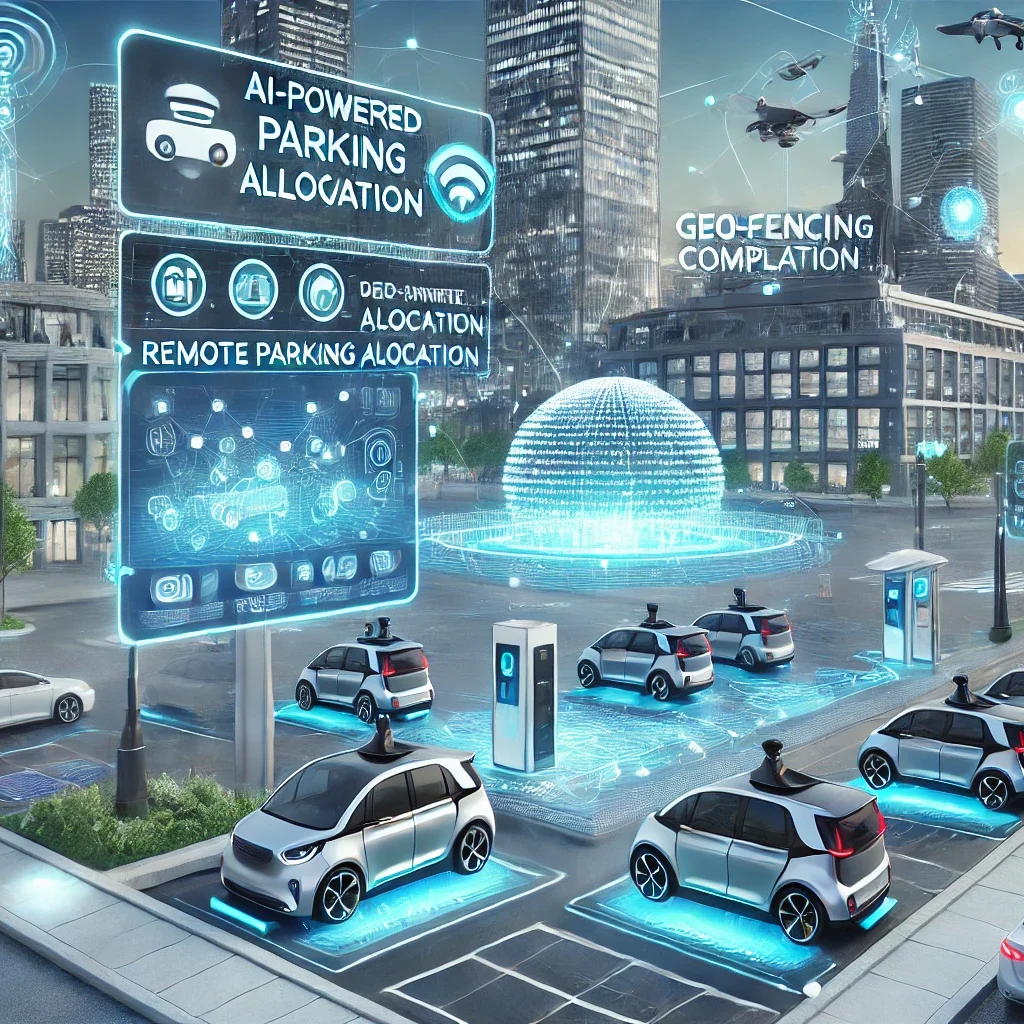
The rise of self-driving cars (autonomous vehicles, or AVs) is expected to transform urban mobility, including how and where vehicles park. Instead of requiring parking near their destinations, AVs can drop passengers off and relocate themselves to distant parking areas. While this could reduce demand for city-center parking, it also introduces new challenges, such as the potential for unregulated AV congestion, inefficient use of remote parking zones, and increased traffic as vehicles travel empty to park or reposition.
Cities must adapt to this shift by implementing smart policies and infrastructure to manage AV parking effectively. Without proper regulation, AVs might cluster in certain areas, leading to new traffic bottlenecks or underutilized parking spaces. On the other hand, if managed well, AV parking could reduce the land needed for traditional parking structures, freeing up space for other urban uses such as green spaces, housing, or commercial development.
Stakeholders & Their Roles
- City Governments & Urban Planners – Responsible for zoning laws, traffic regulations, and urban infrastructure.
- Commuters & City Residents – Depend on convenient, affordable parking and efficient transportation.
- Parking Lot Owners & Operators – Manage parking spaces and could be impacted by reduced demand or the need for new business models.
- Ride-Sharing & Fleet Companies (e.g., Uber, Waymo, Tesla, etc.) – Rely on efficient AV deployment to optimize costs and availability.
- Business Owners & Commercial Property Developers – Affected by shifts in parking availability near their businesses.
- Real Estate Developers – Might need to repurpose existing parking structures for other uses.
- Environmental & Transportation Advocates – Concerned with reducing congestion, pollution, and land use inefficiencies.
- Law Enforcement & Traffic Management Authorities – Need to enforce regulations for AV drop-off, pick-up, and parking compliance.
Pain Points
- Unregulated AV Parking Zones – Without proper rules, AVs might park in unintended areas, disrupting traffic or creating inefficiencies.
- Congestion from Empty Vehicles – AVs driving to park themselves could add unnecessary traffic, increasing urban congestion.
- Loss of Parking Revenue – Cities and parking businesses might see a decline in revenue as AVs utilize cheaper remote locations.
- Increased Demand for Remote Parking – AVs will require large-scale, strategically located parking areas, which may not yet exist.
- Infrastructure Adaptation Costs – Retrofitting existing parking garages to accommodate AVs (charging stations, optimized layouts) will be expensive.
- Unclear Regulatory Frameworks – Many cities lack clear policies on where AVs can park, leading to potential legal and operational confusion.
- Equitable Parking Access – AVs owned by wealthier individuals or companies could monopolize prime parking areas, leaving fewer options for traditional vehicles.
- Land Use Optimization Challenges – Cities will need to decide how to repurpose obsolete parking spaces in ways that benefit communities.
- Energy & Environmental Considerations – Remote parking lots may need extensive EV charging infrastructure, which could strain local grids.
- Security & Liability Issues – Unattended AVs in remote locations might be targets for vandalism or cyber threats.
Key Competitors
- Tesla – Tesla’s Full Self-Driving (FSD) technology enables AVs to navigate city streets and potentially park autonomously. However, Tesla does not provide large-scale AV parking solutions.
- Waymo (Alphabet Inc.) – Waymo operates an autonomous ride-hailing service, focusing on efficient AV deployment, but lacks a dedicated parking management system.
- Cruise (GM) – Cruise operates self-driving taxis and may need remote parking solutions for fleet optimization.
- Aptiv (Motional – Hyundai & Aptiv JV) – Specializes in autonomous driving technology and partners with ride-hailing firms but does not focus on AV parking.
- ParkMobile – Provides digital parking solutions for traditional vehicles but has not yet tailored its services for self-driving car fleets.
Startups Working on AV Parking Solutions
- Steer Tech – Develops autonomous parking solutions that allow cars to self-park in designated areas.
- Metropolis – AI-driven parking management that could be adapted for AV-specific parking solutions.
- Parkade – Offers shared parking space management, which could integrate with AV parking needs.
- FlashParking – Develops smart parking infrastructure that could support AVs.
- REEF Technology – Converts underutilized urban spaces into logistics hubs, which could be repurposed for AV parking.
- Grid Smarter Cities – Focuses on intelligent urban mobility, including AV parking optimization.
- Udelv – Specializes in autonomous delivery vehicles, which also require efficient parking solutions.
- Nuro – Focuses on self-driving delivery vehicles that need designated parking areas.
- Lacroix City – Works on smart road and parking solutions that could integrate with AVs.
- Blinq.AI – Uses AI to optimize parking availability, which could extend to autonomous vehicles.
Top Innovations in AV Parking
- Automated Valet Parking Systems – Some companies (like Bosch and Mercedes-Benz) are testing self-parking solutions for AVs in designated parking garages.
- AI-Based Parking Demand Prediction – Uses real-time data to optimize AV parking locations.
- Smart Parking Infrastructure – Smart sensors and IoT-enabled parking spots specifically for AVs.
- Remote Parking Facilities for AVs – Specialized lots designed only for self-driving cars to reduce urban congestion.
- Dynamic AV Parking Pricing Models – AI-based pricing models that adjust based on demand and location.
- EV Charging Integrated Parking – Dedicated AV parking lots equipped with charging stations.
- Geo-Fencing for AV Parking Management – Regulates where AVs can and cannot park to prevent congestion.
- Blockchain-Based Parking Access Control – Secure, automated transactions for AV parking fees.
- Shared Autonomous Vehicle (SAV) Parking Networks – Pooling resources among AV operators for optimized space usage.
- 5G-Enabled AV Parking Coordination – Real-time communication between AVs and parking infrastructure.
Recent Investments in AV Parking & Mobility
- Waymo raised $2.5 billion (June 2021) to expand its autonomous vehicle services, including fleet optimization.
- Cruise secured $10 billion from GM, Honda, and Microsoft (2021-2023) for autonomous mobility, potentially including parking solutions.
- REEF Technology raised $700 million (2020) to convert underutilized spaces, potentially into AV parking hubs.
- Metropolis AI raised $1.7 billion (2023) for AI-based parking solutions, which could expand to autonomous parking.
- FlashParking acquired by Arrive (2021) to enhance digital parking services, which could be adapted for AVs.
Product Vision
We envision a smart, AI-powered AV parking management system that enables autonomous vehicles to park efficiently in designated remote lots, reducing urban congestion and optimizing land use. The solution will integrate:
- Automated AV Drop-off & Parking Coordination – AVs will navigate to specific remote parking areas autonomously after dropping passengers off.
- Dynamic Parking Allocation – AI-based systems will predict demand and direct AVs to the most efficient parking locations.
- Geo-Fencing & Regulation Compliance – Smart zoning rules will ensure AVs park in approved areas, preventing congestion.
- Integrated EV Charging & Maintenance – Parking hubs will include charging stations, automated maintenance, and fleet optimization.
- Real-Time Monitoring & Pricing – AI-driven dynamic pricing models will adjust based on demand, ensuring optimal utilization.
- Cloud-Based Fleet Management – AV fleet operators can monitor and control parking remotely.
- Sustainable Urban Land Reuse – Freeing up traditional parking spaces for other urban development projects.
This solution will be beneficial to city governments, fleet operators, urban planners, and businesses by creating a seamless AV parking ecosystem that balances efficiency, sustainability, and revenue generation.
Use Cases of the Product
- Fleet Parking Optimization – Autonomous ride-hailing services (Waymo, Cruise, Uber) can park their idle vehicles in remote lots instead of occupying city-center spaces.
- Smart City Integration – Municipalities can regulate AV parking zones and optimize city-wide parking space utilization.
- Dynamic Pricing for Parking – AI-driven demand-based pricing encourages AVs to park in underutilized areas.
- EV Charging Integration – Dedicated parking hubs ensure that electric AVs are charged and ready for operation.
- Traffic Reduction in Urban Areas – AVs will be directed to park away from congested city centers, reducing unnecessary traffic.
- Retail & Business Synergy – Businesses can offer parking incentives for AVs to drop off customers and park in designated locations.
- Automated Parking Garages – Smart multi-level parking facilities designed specifically for AV fleets.
- Real-Time Parking Monitoring – Governments and fleet operators get real-time insights into parking patterns and congestion.
- Car Rental & Shared Mobility Solutions – Companies like Zipcar or Turo can use remote AV parking for automated fleet storage.
- Autonomous Truck & Delivery Parking – Logistics firms can park self-driving delivery vehicles in optimized locations to reduce last-mile congestion.
Summary of the Research
The rise of self-driving cars is set to transform urban parking dynamics. Instead of requiring city-center parking, AVs will autonomously drop off passengers and relocate to remote lots, reducing congestion and optimizing land use. However, without proper regulation and infrastructure, new challenges such as unregulated AV parking, increased traffic from empty vehicles, and underutilized spaces could emerge.
Our solution envisions an AI-powered AV parking management system that dynamically allocates parking spaces, integrates geo-fencing for compliance, and incorporates EV charging infrastructure. This system will cater to city governments, fleet operators, urban planners, and real estate developers by providing real-time monitoring, dynamic pricing, and automated parking coordination.
Market research indicates that while companies like Tesla, Waymo, and Cruise are advancing autonomous mobility, there is no comprehensive solution dedicated to large-scale AV parking optimization. Startups such as Steer Tech and Metropolis are developing AI-driven parking solutions, but gaps remain in remote AV parking hubs, predictive demand management, and full-scale fleet integration.
